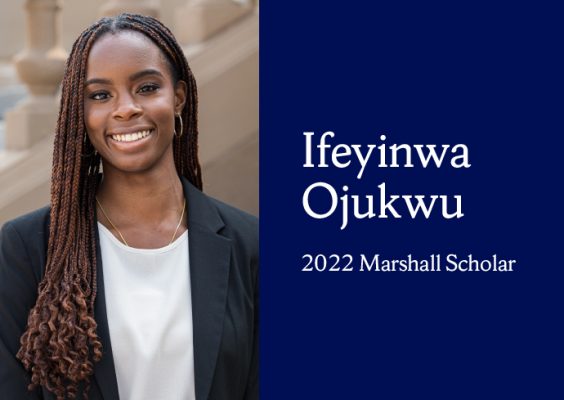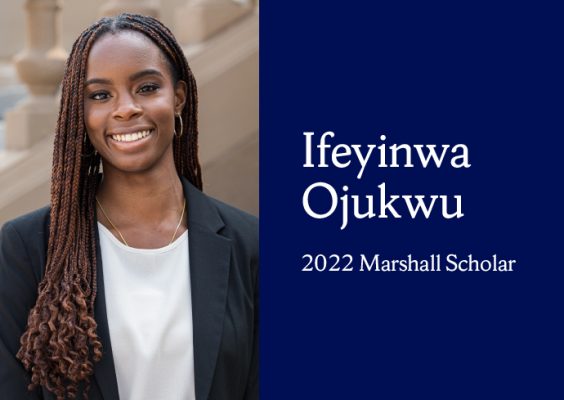Campus & Community

Ifeyinwa Ojukwu, a biology and psychology major in the College of Arts and Sciences with a minor in public health in the Falk College of Sport and Human Dynamics, has been named a 2022 Marshall Scholar. Founded in 1953, the Marshall Scholarships finance young Americans of high ability to study for a graduate degree at an institution in the United Kingdom in any field of study. Ojukwu was one of 41 students selected from around the country and is Syracuse University’s fourth Marshall Scholar.
A Coronat Scholar, a 2021-22 Remembrance Scholar and a member of the Renée Crown University Honors Program, Ojukwu will pursue a master’s degree in precision medicine (PM) at University College London. Upon completion of her Marshall scholarship, she plans to pursue an M.D./master of public policy program in the U.S.
Below, she talks about the scholarship and reflects on her experiences.
-
01
Your goal is to disrupt race-related health disparities as both a physician and health policy advisor. How do you believe the Marshall Scholarship will help you prepare for your journey towards that goal?
“Race-related health disparities in patient care and outcomes are unfortunately abundant in the U.S, and I’ve come to realize that our approach to solving these issues will have to be multi-faceted and comprehensive in order to be effective. I believe one such facet lies in precision medicine, a medical model that more actively takes into account patients’ individual genetic and environmental characteristics. As a future physician and health policy advisor, I hope to be a part of this field’s expansion and broadened application in medical practice and treatment. I believe my Marshall year will be integral to achieving this goal. I am eager to learn more about the field as well as to conduct research in precision medicine, as I know I will derive insights that will be important to my future M.D./master of public policy training and later career.”
-
02
During your time at Syracuse University, you have been engaged in research at SUNY Upstate Medical University on a rare neurodegenerative disorder. How has that inspired you to pursue a career in medicine?
“The research I conduct studies the mutated protein that gives rise to pantothenate kinase associated neurodegeneration (PKAN), an autosomal recessive genetic disorder. My research most directly supports our study’s patients, all of whom reside in Cabral, an underresourced town in the southwestern Dominican Republic. While PKAN is rare globally, it has a 1,000 times higher prevalence in Cabral. I traveled to Cabral in January 2020 with other researchers and physicians on the research team. On this trip, I met a number of our patients and their families and came to learn more about the history of the disproportionate burden this disease has placed on their community.
“My research makes clear to me what it is to recognize a community’s needs and attend to them earnestly, as I feel a career in medicine calls for. The research work can be challenging, but it is worth it to have a positive impact on this underserved community. It has inspired me to be very intentional about the work I pursue in my future career in medicine so that I can continue to help such communities in the U.S. As a physician, I hope to work at an academic medical center that sees to the care of an underserved community, allowing me to work directly with patients affected by health disparities. Because macro-level systemic issues drive many of these disparities, I also aspire to make evidence-based contributions to health policy by supporting research and consulting with legislators and administrative bodies.”
-
03
You have been a student leader in contributing to the University’s diversity and inclusion-related objectives. Tell us about some of the things you have done. What have you learned from these experiences?
“I have enjoyed having the opportunity to contribute to racial equity and diversity and inclusion-related objectives here at SU. I am a member of the biology department’s Inclusion, Diversity, Equity and Accessibility committee. I developed a proposal for and saw through to curricular approval a new course entitled “Race, Health and Healthcare,” which focuses on critical examination of race and health in the context of race-related health disparities. I helped coordinate student participation in SU’s inaugural Race Equity Academic Symposium. I led the Rebecca Lee Pre-Health Society (RLPHS), a pre-health professional organization, with a focus on centering the voices of people of color in health care and promoting cultural competence through RLPHS programming.
“I also worked with my fellow 2021-22 Remembrance Scholar cohort to organize a clothing drive across SU for newly resettled Afghan refugees in Syracuse. These endeavors have taught me that it is within my power to inspire and effect the change that I wish to see. I now view myself as a leader and an advocate in a way that I didn’t really think I could be until I was well into my professional career. They have also taught me the importance of working through hurdles and seeing things through to the end, as you otherwise could stifle positive outcomes. I know these are lessons I will carry with me through all of my future efforts.”
-
04
You are particularly interested in the development and equitable expansion of biobanks in the U.S. How do biobanks have the potential to shape the future of medicine?
“I believe that biobanks, especially those that are diversely enrolled and accessible to researchers, facilitate scientific inquiry and discovery. There are many different kinds of biobanks—some with more specific purposes than others—but they generally compile biological samples, genetic data and a wide range of health and lifestyle information from participants. This is the sort of data that is needed for researchers to determine associations between patient characteristics and certain health outcomes and illnesses. Such findings have historically set researchers along the path to developing more patient-specific diagnoses and treatments, which is the crux of precision medicine.
“I expect the sheer volume and range of data made available to researchers via biobanks will make this objective all the more possible as medicine and technology advance. I am particularly optimistic about the applications of epigenetics-based precision medicine as a means for uncovering and addressing the factors that communities of color are disproportionately exposed to may contribute to the racially disproportionate health outcomes we see today.”
-
05
How did you find out about the Marshall Scholarship? What do you encourage fellow students to do if they are interested in this kind of opportunity?
“I found out about the Marshall Scholarship from Jolynn Parker, director of the Center for Fellowship and Scholarship Advising (CFSA). I’ve been fortunate enough to receive application-related guidance from Jolynn since my sophomore year. She has helped me identify a number of scholarships that align with my career interests, including the Marshall Scholarship. After looking further into the scholarship myself, it became clear to me that I wanted to apply for this opportunity. It took a lot of time and effort to prepare my application, but it was a process made substantially easier by the feedback I received from CFSA staff and also SU faculty when preparing for my interview. The office is so supportive. I really do encourage my peers to get in touch with CFSA if they want to learn more about or apply to any nationally competitive scholarships.”
Students interested in applying for national scholarships that require University endorsement, such as the Marshall Scholarship, should complete an “intent to apply” form with CFSA by the end of June 2022 and plan to work with CFSA.






More Stories
Discovering 6 Luxurious Hotels in Spain and Portugal
Sports for the soul: How being active improves your mental health
Teams debate the power of sport at the Commonwealth Secretariat